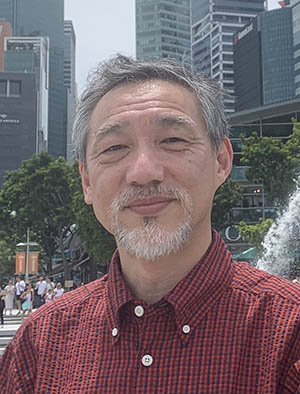
To all members of the Molecular Biology Society of Japanese (MBSJ),
I have been elected as the 24th President of the society. Over the next two years, I am committed to dedicating myself to the management of the society to contribute to advance in science and molecular biology in Japan, as well as to support the research activities of MBSJ members.
I have been a member of MBSJ for over 30 years since I joined as a graduate student member, including six years abroad as a postdoctoral researcher. In my career, I have worked at various research institutions, including Hokkaido University, the University of Oxford, Tokyo Medical and Dental University, Kyoto University, the National Institute of Information and Communications Technology, Osaka University, and the Tokyo Institute of Technology. Currently, I am affiliated with Institute of Science Tokyo, which was just established in 2024. I did not come from a prestigious laboratory, and I left my doctoral program without completing it, earning my degree through dissertation submission. I have also experienced contract expirations and submitted numerous applications for faculty positions over the years, making my career anything but shining. As a student member, I did not have my own positive data and was unable to present at the annual meetings, but I found inspiration in others' presentations, which motivated my research activities. Since becoming a regular member, I have attended almost every annual meeting except for the years I was living abroad.
My first involvement in the society’s activity was in 2007-2008 when I was appointed as a member of the Working Group on Misconduct Paper Investigations. At that time, I was going through a difficult period due to the expiration of my research contract, but it was a valuable opportunity to learn about research ethics. In 2017, I was first elected as a board member and have since served as a member of the Career Development Committee, the Research Ethics Committee, the General Affairs Officer, and the Public Relations Officer. From 2019 onward, I have been part of the Executive committee, working on various initiatives unique to MBSJ, including internationalization efforts (under the 21st President Agata), signing the DORA declaration (under the 22nd President Shirahige), and advocating for increased KAKENHI funding (under the 23rd President Gotoh). Additionally, I served as the 47th Annual Meeting President in 2024.
Recently, there have been concerns about research in Japan, and the field of molecular biology is no exception. As the largest academic society in the basic life sciences in Japan, we have a social responsibility. Under President Goto’s leadership, the 23rd term of the society actively campaigned for an increase in KAKENHI. We collaborated with the Union of Biological Science Societies (led by Prof. Kazushige Touhara) and engaged in petitioning activities alongside many other academic unions and societies. As a result of these efforts, the FY2024 supplementary budget allocated 5.2 billion yen to strengthen the internationalization and support for young researchers. Moreover, the FY2025 budget proposal includes a 200-million-yen increase, bringing the total KAKENHI budget to 237.9 billion yen. Although this increase is modest, it is a step forward from the budget at 237.7 billion yen for several years, and we hope it will lead to further increases in the coming years. In the 24th term, we will continue to collaborate with related organizations, including academic unions and societies, to advocate for further increases in KAKENHI. However, increasing KAKENHI alone will not resolve all issues related to the research environment. We also need to address the conditions of JSPS Research Fellows, career path issues for young researchers, and the improvement of basic operating budgets for educational and research institutions.
Another key external initiative for the society is internationalization. Discussions on this topic have continued over multiple terms, but internationalization does not simply mean transitioning to English. While each annual meeting determines its own policy on English usage, the advancement of translation tools has made multilingual communication significantly easier. Beyond language, internationalization also involves ensuring diversity, establishing codes of conduct for annual meetings, and improving public relations. We also aim to strengthen international collaborations. In recent years, we have consistently received support from EMBO for activities such as poster clinics, publishing ethics discussions, and award selections at our annual meetings. Moving forward, we plan to enhance our collaboration with EMBO beyond just the annual meetings. Additionally, we will explore sustained partnerships with the American Society for Cell Biology (ASCB) and the Australian Society for Biochemistry and Molecular Biology (ASBMB).
There are many other issues that the society needs to address. One priority is re-evaluating the publishing and editorial structure of “Genes to Cells” journal. Although the journal is already recognized internationally, we need to further enhance its presence. With the support of our new Editor-in-Chief and Editorial staff, we will consider reforms such as refreshing the Editorial Board. Another issue is the outdated style of our society’s website, which we plan to renew while considering budget constraints. In recent years, our membership has been slightly declining, but last year, this trend was reversed, with an increase in younger members. To make the society even more attractive, we will also focus on strengthening our public relations efforts.
The Molecular Biology Society of Japan has a tradition of being open and fostering free communication. I value this tradition and will work to create an environment where all members can conduct research and interact freely. Please do not hesitate to share your opinions and suggestions with us.
January 2025
Hiroshi Kimura
The 24th President of the Molecular Biology Society of Japan
Professor, Cell Biology Center, Institute of Integrated Research, Institute of Science Tokyo